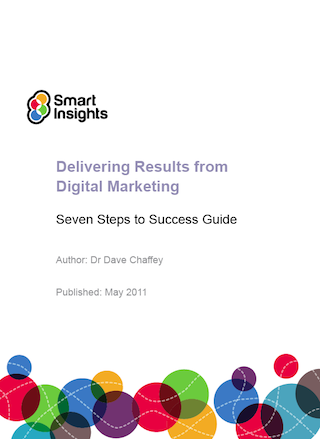Learning from Zig Ziglar and Marc Benioff
 As a busy marketer working client-side, you'll often hear yourself - and others - talk about not having enough time. That there aren't enough hours in the day. I know from my own (sometimes painful) experiences, when I sometimes sit working on the wrong stuff at 1 AM, that this is rubbish - that we all get the same minutes in the day, it's how we choose to spend them that matters. I believe that it's a matter of focus.
As a busy marketer working client-side, you'll often hear yourself - and others - talk about not having enough time. That there aren't enough hours in the day. I know from my own (sometimes painful) experiences, when I sometimes sit working on the wrong stuff at 1 AM, that this is rubbish - that we all get the same minutes in the day, it's how we choose to spend them that matters. I believe that it's a matter of focus.
The challenge of focus
Seth Godin recently wrote about FOMO (fear of missing out) and it really resonated from a marketing perspective. Passionate marketers often run themselves and each other ragged, worrying if we're all missing out on the latest insight, learning, app, model, idea, case study or news piece. I understand that, it's often a pressured job function. There's always something stopping us from focussing - that we feel we're missing out somehow. So the hours worked add up and the days get longer. The other perspective, of course is that we don't actually commit, or do the work, we spend too much time thinking about the less important stuff, only thinking about getting the work done. One huge advantage that you can have over your competitors is to deliver, to pick the right stuff and focus on getting it done, to relentlessly drive forwards. There will always be an abundance of other avenues, ideas and options - but focus is required today.

Recommended Guide: Delivering results from digital marketing
Our Results guide explains a system to set goals for digital marketing and reach those targets.
Download our Delivering results from Digital Marketing Guide.
What is the best approach to gaining focus?
I cannot lay claim to originating an effective 'system', but I've read and applied (and fought with!) a fair amount of ideas to get focus. The best ones for me are not born from apps or systems such as 'GTD' (though they have their place too of course), but in simple, transparent processes - not trying to do too much is the biggest thing to discipline. So how do you do it?
The Experts
Zig Ziglar, to my mind, pioneered this in the 1980s with his Goals methodology. He approaches it from a personal perspective of course, so it's important you realise that as a perspective and translate it to apply at work…
- Write your goals down
- Date them
- Identify obstacles
- Identify the people/organisation that you need to work with to accomplish the goals
- Find out what you need to know, if anything, to achieve them
- Develop a plan of action, a list, with time limits
- Identify “What’s in it for me?” - what rewards and benefits will I get?
As a more commercial alternative, though very familiar when you've read Zig's earlier approach, also consider Marc Benioff's system (he's the founder of the $2Bn software giant Salesforce.com, if you didn't know and ex-Oracle guru). I recently read about his V2MOM system here, he gives a lot of advice in that interview and one of his keys to success is "you should not allow yourself to get disfocused… An entrepreneur can have a sort of ADD type of thing (Attention Deficit Disorder)… and you have to build the tools to help you refocus yourself and channel that energy".
"[At Salesforce.com] We have an internal tool that I use and a communications cadence to help me to stay focused – I can be the kind of person that needs help staying focused. That tool is called a V2MOM (an acronym that stands for Vision, Values, Methods, Obstacles, and Measures). These are five questions that I’m constantly asking of myself. I do that basically every six months for the company…"
I can paraphrase his advice for you:
- Vision: What do you want? Write it down in 10 to 15 words
- Values: What is most important about that vision? What are the values of the vision? Is it growth, is it quality, is it excellence? Write those things down and prioritize them.
- Methods: How are you going to achieve it? What are the actions that you’re going to specifically take? In priority, write them down.
- Obstacles: What is preventing you from achieving that outcome – right now? Write it down. What other obstacles may occur?
- Measures: How will you know if you’re successful? What are the measurements of success? Write it down.
Benioff suggests that we recreate this on a continual basis, and get others in the team to do the same. It's a focusing exercise, I like how he appreciates the value of others in your team and organisation seeing what you’re doing, what you're focussing on, as much as you or I knowing what we're focussing on. It creates trust and alignment Of course, you’ve got to walk your talk… "If you’re gonna write it down and say you’re gonna do it, you better do it", he says.
I learned the hard way when working client-side that if you don’t have alignment it can be a real battle, for everyone, especially those not in the management team. But -- if you can get everybody on the same page, it's a "super-charger", as Benioff suggests.
Create a process to align marketing
This is the really important bit - actually applying this stuff at work and with a marketing team (or wider ideally!). Some time ago I read a book called the Toilet Paper Entrepreneur and loved it. Mike Michalowicz, the author, probably gave me the best, most obvious, advice on applying the 'systems' in a marketing or commercial environment where it's about more than just you. It's something I've done ever since and we've even shared how we apply it at First 10 Digital in this post - you can also see the 'resources' section on the TPE website. With your vision piece in place you know your top level focus, it's simple to turn this into more detailed, collaborative and focussed action:
- Design the daily and weekly measures, Michalowicz advises only a handful, the really important drivers. This in itself is a powerful concept, of course the '5' may vary according to your role or function, I've found. In order to focus, tighten your attention to the measures that matter. This is going to enable to you to know if you need to dig deeper when any of those measures change negatively, and not lose focus when they're positive by drifting into 'nice to know' information. Save that for specific reports on a monthly or quarterly basis if you can.
- Align the whole marketing team with a '90 day plan'. This is the powerful bit. I always struggled with annual goals, they seem so far off that I could lose focus, whereas 90 days is long enough to impact, it's exciting to see positive change, to deliver, yet not so long as to feel distant. Of course a 90 day (or quarterly plan) can easily cascade from an annual marketing or commercial plan once that's created. We set something around 5-7 SMART objectives, and then ensure all key milestones or deliverables are working towards making one or more of those goals realised, each millstone or deliverable is owned by somebody and it has a date next to it. Smart Insights Expert members can download our 90 Day Planning Template which is a popular part of our Digital Strategy Toolkit. Using this, a whole team will know what they're doing without having to get into each others specific task-lists - it avoids micro managing, it gives alignment and focus to the manager and the person doing it, it also enables management of expectation at the senior level of the business, total transparency as to what marketing is doing to help the business. I always found that pretty liberating!
I hope this helps, any tips or ideas you have for focus? Please share in the comments.










